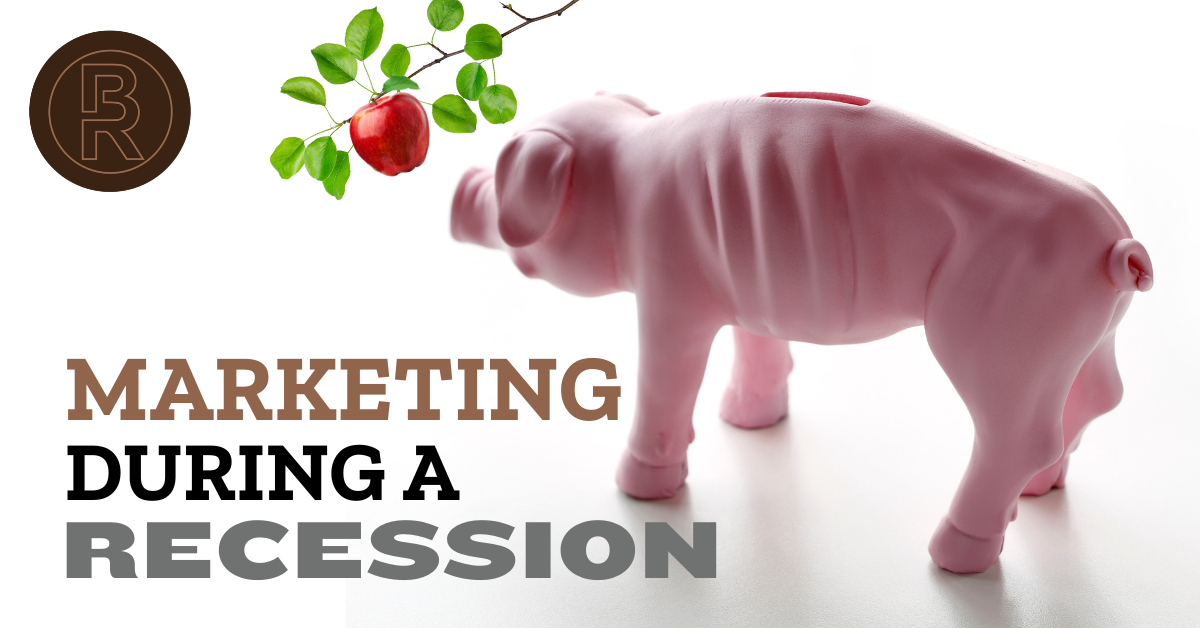
Businesses and consumers have been eyeing several slumping economic indicators throughout 2022. Navigating persistently growing inflation, higher interest rates, and a declining stock market has been difficult for many. As marketers, we are faced with inquisitions from business owners who are seeking advice on how they should approach marketing during a recession, especially when the volume of leads decreases and/or revenue decreases. In this situation, we investigate many different factors which help us determine and address the most likely causes of these decreases. Internal factors, such as an ineffective marketing message, are typically simple to resolve. External factors, such as a looming recession, can be a bit tricky.
What is a Recession?
The historical definition of a recession is when the GDP (Gross Domestic Product) declines in growth for two consecutive quarters. In the first two quarters of 2022, real GDP growth in the US was in the negative. There are other financial indicators that signal a recession including an inverted yield curve on government bonds, a rising unemployment rate, and declines in the stock market. After a quick search (yield curve, unemployment rate, and stock market) you will find that as of Q3 in 2022, the figures all indicate that the economy is in recession. However, a recession does not necessarily have to mean doom and gloom for all!
The Good and the Bad
Some businesses actually thrive during recessions and are sometimes called, “recession-proof”. Examples of these types of businesses include grocery stores, healthcare providers, discount stores, auto repair, home maintenance stores, and accountants/financial services professionals. Any business that provides goods or services that fall under the category of mandatory or non-discretionary expenses will tend to fare well during recessions. Businesses that provide goods and services considered discretionary are at greater risk as consumers are forced to delay their plans of making larger purchases or spending their income on things such as dining out, vacation travel, and entertainment.
Marketing During a Recession
In the event of a recession, many companies cut spending on special projects, technology such as electronics and software purchases, shipping, and unfortunately, workers. In addition, marketing budgets are typically cut or altered in some way. Part of our job as a marketing firm is to advise our partners on how to best allocate their marketing spend. During the COVID-induced economic recession in 2020, our overall client sales grew 26% (2020 vs 2019 sales) for all industries. For our clients in the home services industry, we saw sales growth of 300% over the previous year!
So, what do we recommend when marketing during a recession?
Create a Plan
The most important thing you can do when marketing during a recession is to already have a plan in place long before a recession hits. All businesses should create a contingency plan for external economic events that may impact the company’s bottom line. Without a plan, you could be left scrambling for a solution causing additional stress and potentially missing opportunities.
Know Your Top Performing Channels
Marketing attribution can help you distinguish your top performing marketing channels from your lower performing channels. Understanding which marketing tactics are contributing the most to sales and conversions is crucial because it can help identify where you are able to cut spending as well as how much you should cut. Cut back on underperforming channels and either shift budget to the better performing channels or keep the savings.
A caveat to temporarily cutting marketing budgets is that it can be difficult to recover market share once the economy improves. This gives your competitors an opportunity to swoop in and take what you left behind. We rarely advise a business to completely cut out a channel and we don’t suggest going “all in” on one channel. The goal is to continue to hit all the touchpoints with the right message throughout the different stages in the marketing funnel.
Personalization and Brand Trust
Customers in today’s marketing landscape want a more personalized marketing experience. The ability to understand your customer and relate to them and their needs is how you can stand out against your competitors. In addition, businesses and brands need to connect with their customers and provide them with relevant messaging. During a recession, the messaging should try to invoke feelings of sentiment and also show empathy. A “hard sell” approach is going to give off the vibe that the company doesn’t have the customer’s needs in their best interests. Brands will come across as out of touch and can lose consumer trust. The best approach is to try and think like your typical customer and craft your messaging based on that mindset.
Stay the Course
Overall, the best plan of action for marketing during a recession is to stay the course, don’t make any drastic changes, and understand that recessions eventually end. Assess if your business is recession-proof and if you can afford to keep all your marketing efforts alive. You will find benefit from going above and beyond your customer’s expectations. Providing quality customer service should already be a standard for your business and won’t cost you anything extra. Lastly, remember that most everyone is feeling financial stress. Figuring how you can help ease the stress of your customers will send a positive message and strengthen those relationships long after the recession is over.
At Brand Ranch Media, we have helped our clients navigate through both busy and slow seasons as well as stronger and weaker economies. We have the experience and foresight to help you reach your business goals. Give us a call at 713-309-6380 or use our contact form to start the conversation today!

1 thought on “Marketing During a Recession”
Correct.
Comments are closed.